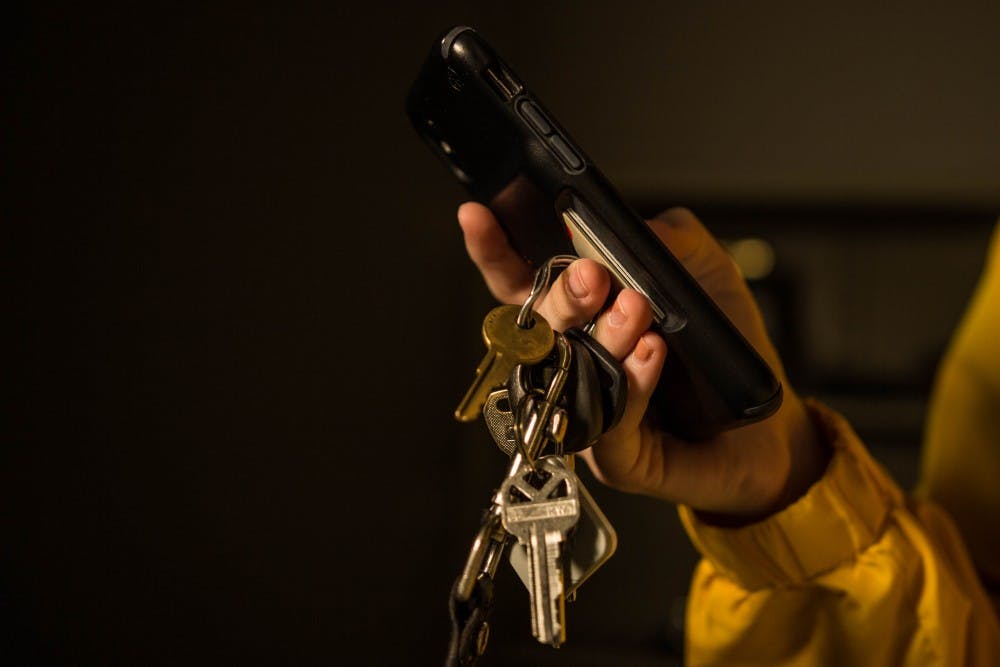Arizona Gov. Doug Ducey signed legislation on Monday that will immediately ban the use of handheld devices while driving in Arizona, making it the 18th state in the nation to pass such a law.
The ban comes almost five months after the death of Salt River tribal police Officer Clayton Townsend, who was struck and killed by a driver texting and driving.
"Let’s send a message that that text message can wait," Ducey said at the signing ceremony. "It’s not worth your life."
House Bill 2318 will prohibit drivers from using handheld devices while operating a vehicle, except while parked or stopped, such as when waiting at a traffic light, stop sign or railroad crossing.
There are some exemptions, such as using a device to report illegal activity or call for help in an emergency. Drivers can still talk on their cellphones with a hands-free device, such as a smartwatch or through a car’s interface.
The ASU Police said that, like any other police department in the state, it enforces state laws, including the new legislation.
Townsend’s family was present at the ceremony, along with other families of victims killed by distracted drivers.
Ducey thanked Townsend’s family for advocating for the law’s passing, highlighting Townsend's mother's passion as one of the reasons why he signed the bill into law.
"Through their pain and suffering, we know the true loss of distracted driving," he said at Monday's ceremony. "I think everyone just saw this as such an avoidable death."
Fines for any violations will not go into effect until Jan. 1, 2021, after which fines for initial offenses will range from $75 to $149, and fines for subsequent violations from $150 to $250.
State Sen. Kate Brophy McGee (R-Phoenix) said that her former time on the Arizona State Senate Transportation and Technology Committee helped her learn "firsthand" about the seriousness of distracted driving.
"It is a very serious problem and I was happy to sponsor the legislation to fix that," said Brophy McGee, who was one of the sponsors on HB 2318.
Cities and towns have their own set of laws when it comes to texting and driving. The Tempe City Council approved a texting-and-driving ordinance in February, which imposes stricter fines on violators, including a $500 fine for those who break the law more than twice within a 24-month period.
Read more: Tempe city ordinance makes distracted driving a primary offense
While police may enforce local texting-and-driving ordinances up until 2021, many of the police departments will gradually shift to the state law as the deadline approaches, said Joe Clure, the executive director of the Arizona Police Association.
Brophy McGee said the new state law will standardize rules and consequences across the entire state to make the laws less confusing across different cities.
"It gives both the citizens who want to follow the law and law enforcement who want to enforce it a lot more clearance and guidance," she said.
Opponents to the law, like Arizona State Senate Majority Leader Warren Petersen (R-Gilbert) said that the new law is not necessary as many people are able to juggle using their phone while driving.
"There have been people who have driven their whole lives holding their phone up, talking on their phone, that have not had an accident, myself included," Petersen said during a House vote on April 18.
House Minority Leader Charlene Fernandez (D-Yuma) said she disagreed, saying in a phone interview on Monday that putting away cell phones before driving should be part of drivers' routines, similar to putting on a seat belt.
"I think there are so many moving parts when you’re driving, that when we throw something else like a cellphone in our hand and trying to text and concentrate on what’s coming in, it takes your focus off the road and that’s how accidents could happen," Fernandez said.
The bill passed the House with a 44-16 vote and the Senate with a 20-9 vote. Fernandez said that the bill would have failed to pass if not for the Democrats elected into office during the 2018 midterm elections, who all voted for the bill's passing.
"Elections have consequences," she said. "In 2018, the Arizona Legislature came back with 29 Democrats and they couldn’t have passed this ... without us, they would not have been able to pass it."
Police can cite warnings to violators immediately, but lawmakers believe the two-year grace period for fines will give enough time for the population to understand and adapt to the new law.
"The objective here is not to write tickets, it’s to save lives," Ducey said before signing the bill into law.
Reach the reporter at wmelhem@asu.edu or follow @wissmel on Twitter.
Like The State Press on Facebook and follow @statepress on Twitter.




